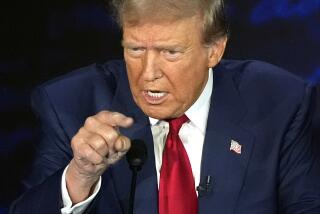GOP debate triggers gut reactions about candidates
A few minutes after the marathon Republican presidential debate ended on Wednesday night, Wisconsin Gov. Scott Walker strolled into the buzz of the spin room to share his self-serving thoughts with the crush of reporters. I listened in on a couple of Walker interviews and observed how his delivery made carefully scripted talking points sound even more artificial than they naturally would be. I was not impressed. Then, I looked at his shoes.
Walker was wearing black motorcycle boots. The governor is a Harley enthusiast, and I suppose he wore the boots to let people know that under the suit and tie beats the heart of a road warrior. Nevertheless, Walker could have been wearing leather chaps and a bandanna and he’d still looked like a junior high choir teacher to me.
I have a visceral reaction to Walker. I think he’s a cocky dweeb. I cannot resist making his eyes just a little more crossed than they actually are when I caricature the guy. It may be unfair, but, in this kind of unscientific assessment, I am no different than any other voter. Visceral reactions are the drivers of democracy. People can talk all they want about the issues that are important to them, but what their gut tells them is usually much more persuasive than what their mind has to say.
If this were not true, Donald Trump would not be the Republican front-runner. By any logical measure, it is laughable that Trump thinks he is qualified to be president. He stood on the deck of the battleship Iowa in Los Angeles Harbor this week and was expected to deliver a major speech about foreign policy. Instead, he did what he always does: He talked about himself and the big crowds he is attracting. Trump does not offer policies, he offers his personality, plus a string of kooky notions that are suggested to him by random people he meets or claims to have met. The one and only plan he cites repeatedly — his grand scheme to build a wall on the Mexican border and deport 11 million immigrants in the U.S. who lack legal documentation — is completely lacking in detail or realism.
Trump is one of those people who does not know how much he does not know. Weirdly, his ignorance gives him enormous self-confidence, and that is very appealing to some voters. They say he speaks what’s on their minds, and, since the things he is saying are such random generalities, what these Trump fans really mean is that he is channeling their visceral anger and disgust with the status quo. He is the embodiment of their gut feelings; his words do not need to make sense.
When Barack Obama was fresh on the political scene in 2008, he presented detailed policy positions, but it wasn’t policy that inspired his most ardent supporters to favor him over Hillary Rodham Clinton. It was his mixed-race identity, his artsy “Yes We Can” posters, the way he looked in aviator sunglasses, his loose stride. He was just damn cool — at least that was the visceral reaction. Meanwhile, folks on the right had a very different and far more nasty gut reaction to the man that has played out over eight years of vicious partisanship.
A voter does not have to agree with a candidate to feel something positive. Bill Clinton charmed plenty of people who were not enthusiastic about his liberal ideas. Marco Rubio’s politics are not much different from Walker’s, but my gut likes Rubio. His big smile seems real. His conservative convictions feel more understandably grounded in the experience of his immigrant family. I get the sense a Rubio presidency would be more flexible and a touch more compassionate than a Walker presidency, but I don’t really know that is true. It is based largely on a visceral reaction. In the same way, I kind of like Chris Christie’s Springsteen-loving, New Jersey-bred, in-your-face attitude, while I am repelled by the smarmy self-righteousness of Ted Cruz.
Some critics said CNN’s decision to set up personal grudge matches between the candidates during the debate detracted from a serious discussion. I disagree. We need to know more about these people than we can learn from policy pronouncements someone has written for them or from the highlights of their resumes. We also need to see how they react to a challenge or respond to an insult, because that will give clues to their temperaments, and temperament is a key factor in determining whether a president will be effective or a failure.
Temperament is a tough thing to judge, though, connected as it is to the deeper psychology of the people who seek to lead us. In the end, our gut may know as much as our brain.
More to Read
A cure for the common opinion
Get thought-provoking perspectives with our weekly newsletter.
You may occasionally receive promotional content from the Los Angeles Times.











